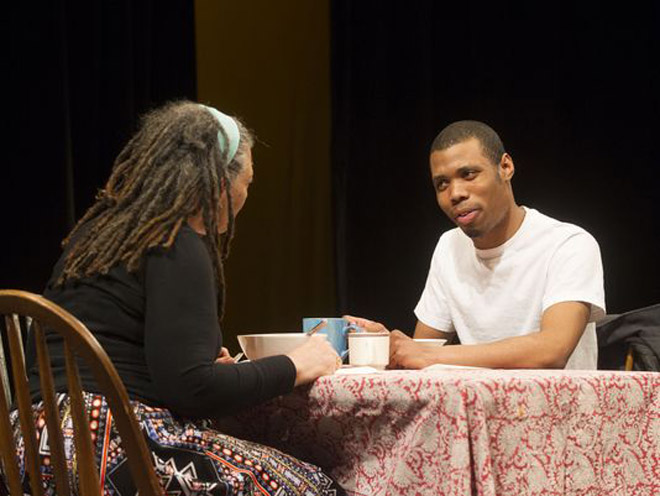The last thing I expected to be doing on a Tuesday evening at the Artscape Arena in Cape Town was watching a series of ten minute plays in America. But technology and an innovative collaboration meant that together with audiences in Iowa and other parts of the world, I did exactly that. Six short plays by American and South African playwrights, three from each country. Watched by audiences and linked by technology, streamed to the world via Book Wings.
Hosted by the University of Iowa, Book Wings is a performance initiative that brings together writers, actors, directors, and new media professionals from all over the world to connect in a virtual environment where they can share ideas and collaborate in real time.
The project kicked off in 2009 as a ‘cultural diplomacy’ project between the University of Iowa and the Moscow Arts Theatre. Since then it has snowballed, commissioning writers from countries including Russia, China and Iraq. The aim is to nurture cross-cultural conversation, spark new literary ideas and create an enduring and internationally relevant body of work.
The idea is simple. Writers from different parts of the world are commissioned to write on a theme for a year. Once auditions and rehearsals are held, performances are launched at local venues and can be watched by global audiences via the internet. This year three playwrights in each country, the USA and South Africa, were selected to write three plays, eight to ten minutes long, on the theme Contact.

Tisch Jones and Damitri Taylor rehearse a performance set from Book Wings at the University of Iowa Theatre Building on Monday, March 9, 2015. David Scrivner Iowa City Press-Citizen
The Plays
Plays produced include Alan MacVey’s Sicawa Street, Keith Josef Adkins’ The Disappointment and Peter Ullian’s Waiting for Marcel to name but a few. Here’s a quick breakdown of the performances:
Sicawa Street is set in post 1994 South Africa and told the tale of tension between mother and a son who have very different attitudes to South Africa’s first democratic election. Keith Josef Adkins’ contribution, The Disappointment, dealt with the history of heartache by an African-American faced with the weight of reconciliation and kinship.
Peter Ullian’s Waiting for Marcel, directed by Geoffrey Hyland and performed in Cape Town tells the story of Samuel Beckett and his fiancée Suzanne Déchevaux Dumesnil who fled from Gestapo occupied Paris in 1942. And Mike van Graan’s play, What we wish For, directed by Amy Jephta was an intimate family story with a sharp unexpected twist.
Blood Pastoral was written by Wessel Pretorius, directed by Alan Macvey and performed in Iowa.It was set on a South African farm. Pretorius provided some coaching via the internet on accent and pronunciation earlier that the day, yet another aspect of the international collaboration. Mandla Mbothwe’s Invisible Eden was about family, music, time and pain which told the story of a mother and son on the brink of life and death.

Book Wings Director Carol MacVey (on screen) as Moscow Art Theatre host Adam Muskin and Russian playwright Ksenia Dragunskaya respond from Moscow
Lively Discussion
The evening’s hosts in both cities, Fleishman in Cape Town and Christopher Merrill in Iowa City, provided a lively discussion about the interpretation of the theme by the playwrights and the choices made by the directors.
The digital connection was not just experienced by audiences at the two performance venues, but viewers around the world who were encouraged to click and watch the show that are streamed live on the university’s website, as well as take part in the post-performance discussion.
Given the connectivity challenges that we face in South Africa hosting the high –definition video-conferencing at the Arena Theatre at Artscape was no mean feat and required the installation of a dedicated connection, but the technological capability is exciting when considering how theatre can be made more accessible to remote communities using digital platforms.
Theatre projects that collaborate across national boundaries provide us with the opportunity to experience the global world we inhabit from a different vantage point, so next time you are invited to a performance in Iowa, I would suggest you say yes. And no, you don’t require a visa or a passport.
Photographs by Thabo Makgolo











What i do not realize is in reality how you’re now not actually a
lot more well-appreciated than you might be now.
You’re very intelligent. You recognize therefore considerably
in relation to this matter, made me personally consider it from numerous various angles.
Its like women and men are not involved except it is something to accomplish with Woman gaga!
Your own stuffs great. All the time maintain it
up!
For most up-to-date information you have to go to see world wide web and
on web I found this web page as a most excellent website for most up-to-date updates.
There are no explicit laws that forbid Koreans from gambling on-line.
my page; 온카지노
Hi there, I found your website via Google while searching for a related topic, your website came up, it looks great. I have bookmarked it in my google bookmarks.Fence contractor Tauranga
By reading “Doc, I am Dizzy,” individuals may learn about available treatments and management strategies for dizziness.The book may offer practical tips for coping with dizziness and improving quality of life.
I read this piece of writing fully concerning the resemblance of most recent and preceding
technologies, it’s remarkable article.
My brother recommended I might like this web site. He was entirely right.
This post actually made my day. You cann’t imagine just how much time I had spent for
this information! Thanks!